When it comes to the world’s biggest football clubs, there are often players and managers that stand out above all others. For Manchester United, the likes of Alex Ferguson, Matt Busby and Eric Cantona take the claim, whilst for Liverpool it would be Bill Shankly, Bob Paisley and Kenny Dalglish.
At Ajax, nobody is able to match the achievements of Johan Cruyff, the footballer who became a manager and who changed the face of the game forever. When he was a player he won the Ballon d’Or three times, whilst when he was a manager he furthered the idea of Total Football.
It is no exaggeration to suggest that Johan Cruyff effectively invented modern football. Having joined Ajax when he was just ten-years-old, he’d made his debut by the age of 17 and won every single thing there was to win that was worth winning by the time he left to join Barcelona.
Little wonder, therefore, that he is considered to be one of Ajax’s most noteworthy players and had the stadium that the club plays its football in named in his honour. A brutally honest and arrogant man, he has variously been described over the years as a professor, a pioneer and a master.
The Early Years
Born Hendrik Johannes Cruyff on the 25th of April 1947, Johan Cruyff, as he came to be known, grew up just five minutes away from Ajax’s home ground. With this in mind, it is perhaps little surprise that it was Ajax that he van playing for when he joined a football club.
The son of Hermanus Cornelius Cruyff and Petronella Bernarda Draaijer and with one older brother when he was born, he grew up in a working class family in the east part of Amsterdam. His dad loved football, encouraging Johan to play football with his schoolmates and Henry, his older brother.
Hermanus Cruyff died of a heart-attack in 1959, which had a big impact on the youngster’s mental health. He saw a football career as a way to pay tribute to his dad, as well as to offer some financial security to the family. His mum had left her work at the grocers and taken up a job as a cleaner at Ajax.
It was whilst there that she met the man who would become her second husband, Henk Angel. He was a field hand at the club and would go on to have a crucial influence in Johan Cruyff’s life. He joined the Ajax youth team on the day that he turned ten years of age.
Becoming a Footballer
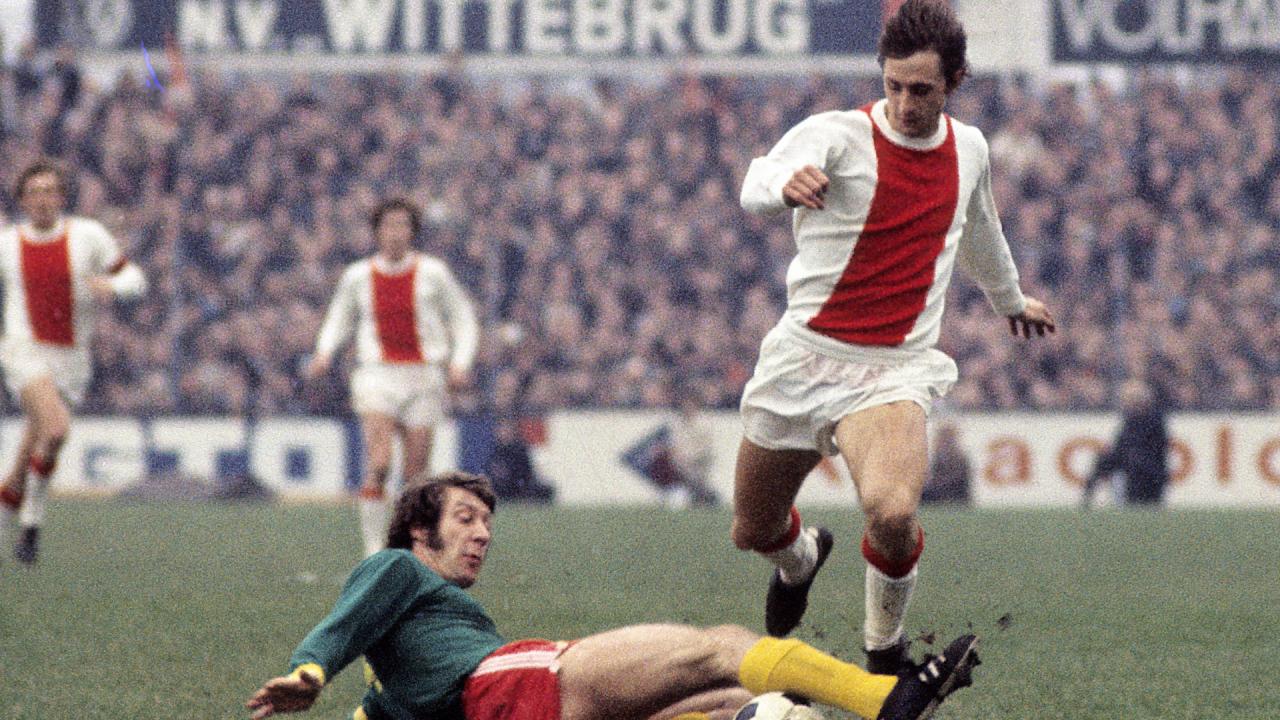
During his youth, Johan Cruyff would play football in their neighbourhood, which was where Jany van der Veen spotted him and noticed his talent. The Ajax youth coach offered the youngster a place in the Academy without needing to have a formal trial, which Cruyff took up even though he preferred playing baseball. He continued playing baseball until he was 15, at which point his coaches urged him to stop.
On the 15th of November 1964, Cruyff made his first-team debut during an Eredivisie match against GVAV. Despite Ajax losing, he scored their only goal in a 3-1 defeat.
🔙 #TBT to November 22nd, 1964, a young Johan Cruyff vs. PSV in his second game with Ajax, the first at home and with a goal. #CruyffLegacy pic.twitter.com/gIwWWqY1CS
— Johan Cruyff (@JohanCruyff) November 23, 2023
It was during the 1965-1966 campaign that Cruyff really began to make a big impression, establishing himself as a regular first-team player when he scored both goals in a win over DWS. There were seven games during the winter and Cruyff scored eight goals, then in March of 1966 he scored a hat-trick during a 6-2 win over Telstar.
He went one better a few days later, finding the net four times as Ajax defeated Veendam 7-0 in a cup match. He found the net 25 times in 23 games, leading Ajax to the league championship and proving that he was a real talent.
Doubles & European Cup Final Debuts
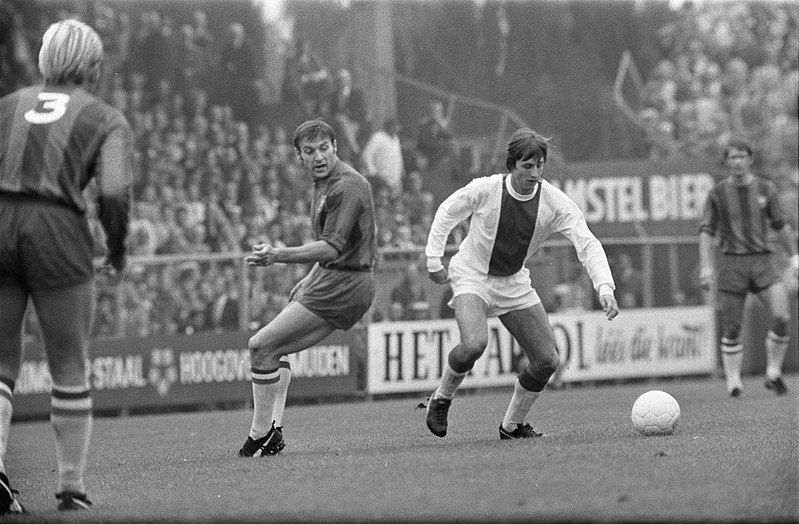
During the 1966-1967 campaign, Ajax won the title again and added the KNVB Cup to it for the player’s first double. They were helped in their challenge by Cruyff’s 33 goals, making him the leading goalscorer in the Eredivisie. He was also named the Footballer of the Year in the Netherlands, which happened again at the end of the following season, during which Ajax won their third league title in succession.
On the 28th of May 1969, Johan Cruyff enjoyed his European Cup final debut, scoring as Ajax lost 4-1 to Milan. Though disappointing, it wouldn’t be his last appearance in the competition.
Having been named the Dutch Footballer of the Year again in 1969, Cruyff enjoyed another double at the conclusion to the 1969-1970 campaign. His progress was halted somewhat at the star of the following season, however, when he suffered a groin injury.
When he returned to the team in October, Gerrie Mühren was wearing his number 9 shirt so he wore number 14 instead. At the time, it was unusual for players not to wear a number from 1 to 11 if they were starting the game, but Cruyff decided that the number 14 would be his shirt of choice from then on, even when on international duty.
Conquering Europe
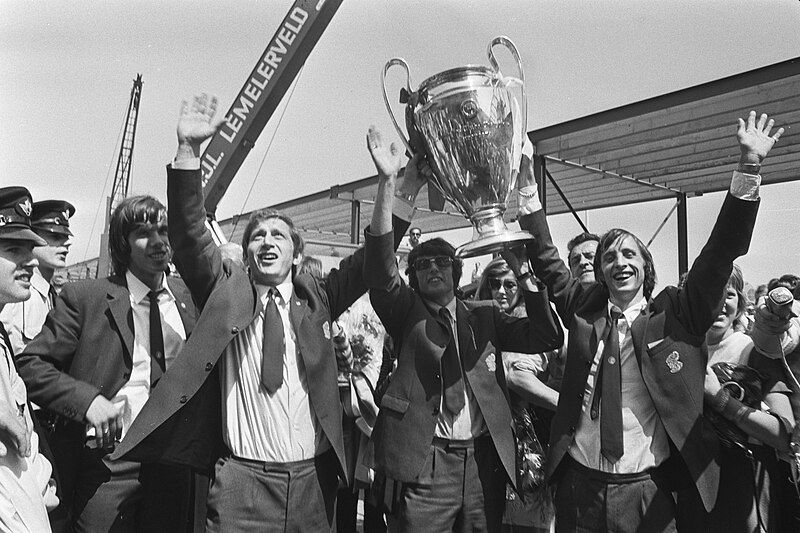
It was the second of June 1971 that saw him make history, however, when Ajax played Panathinaikos in the European Cup final.
The Dutch side won 2-0 in the match at Wembley, seeing them become European champions for the first time. It was the crowning achievement for Cruyff, who was named the European Footballer of the Year. It wasn’t the end of the achievements, neither for him nor for Ajax, with the player scoring both goals in the European Cup final in 1972 to help his club defeat Inter Milan 2-0.
The club also won the Eredivisie with Cruyff being the top scorer, as well as the KNVB to secure a treble. They also defeated Independiente in the Intercontinental Cup, then Rangers in the European Super Cup.
The 1972-1973 season was another successful one for Cruyff and his Ajax side. Having all but perfected so-called Total Football, the team won the Eredivisie title and made it to another European Cup final, this time to face Italian side Juventus. They won 1-0, securing the European Cup for the third time in succession.
It meant that they got to keep the trophy, with sides that had won it three times in a row or five times in total getting to do so. For Cruyff, there was little left to achieve with Ajax as a player and a new challenge was what he wanted as his career entered its twilight years.
Cruyff & Barcelona
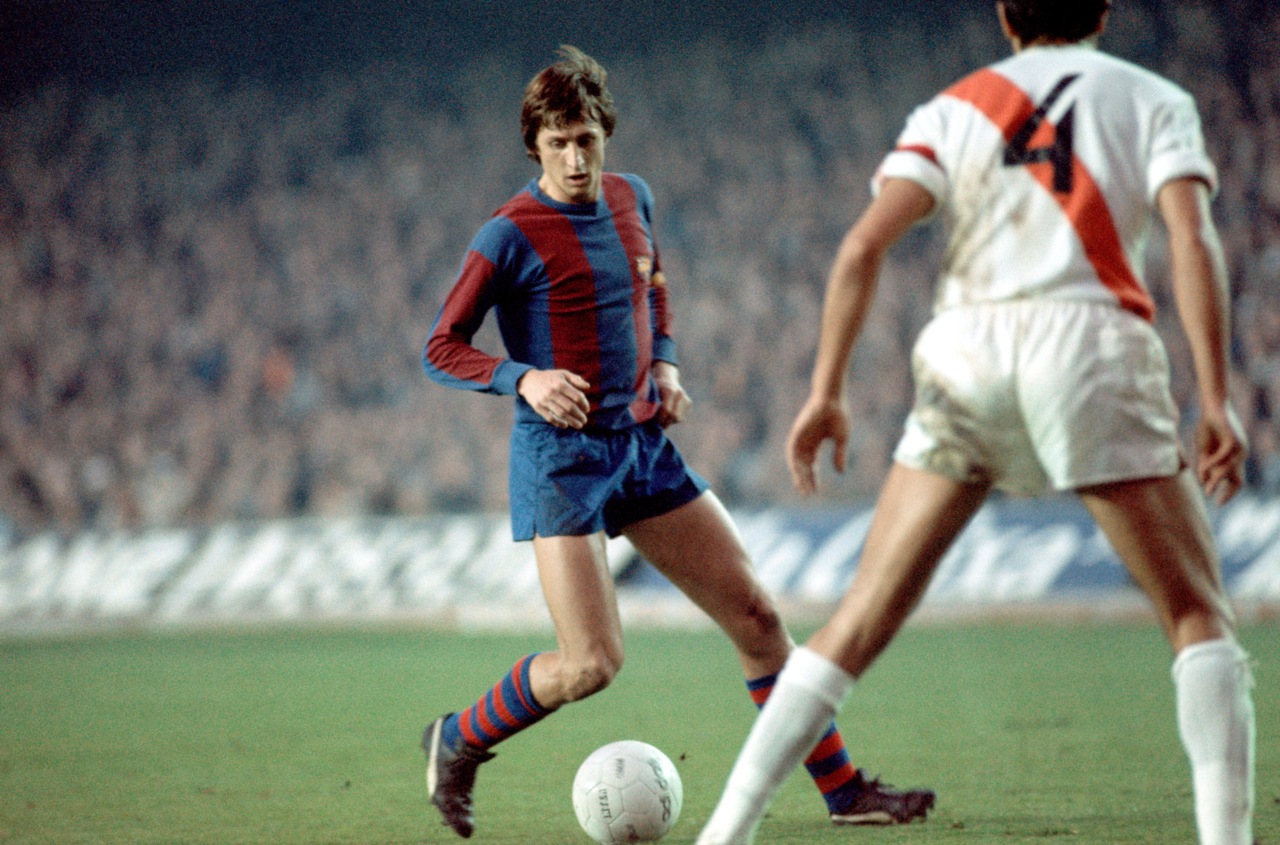
In the middle of 1973, Johan Cruyff made a decision to join the Spanish side Barcelona for a fee of around 6 million guilders. When he arrived at the Camp Nou, he endeared himself to the local fans by giving his son a Catalan name, calling him Jordi Cruyff. More than that, though, he helped them to win La Liga for the first time in more than a decade, even managing to defeat their fierce rivals, Real Madrid, 5-0 in their home of the Santiago Bernabéu.
He offered Barcelona a sense of themselves, boasting speed and flexibility, and was named European Footballer of the Year again in 1974.
“What is speed? The sports press often confuses speed with insight. See, if I start running slightly earlier than someone else, I seem faster.” – Johan Cruyff
Football intelligence means applying all motion to an appropriate intention to achieve game objectives. pic.twitter.com/PWmpjrUK5h
— David Garcia (@IJaSport) November 15, 2023
For all of the player’s incredible achievements, there was one moment during his time playing for Barcelona that became iconic. The ball was crossed and had travelled wide of the far post, but Cruyff leapt into the air and, with the ball at about head height, scored past Miguel Reina with his right heel.
It was dubbed ‘Le but impossible de Cruyff’, or ‘Cruyff’s impossible goal’, and saw fans of the club try to recreate it in the documentary “En un momento dado’. In 1978, Barcelona won the Copa del Rey when they defeated Las Palmas 3-1. Three years earlier, he had randomly played two goals for Paris Saint-Germain in the Paris Tournament.
A Brief Retirement & Return to Ajax
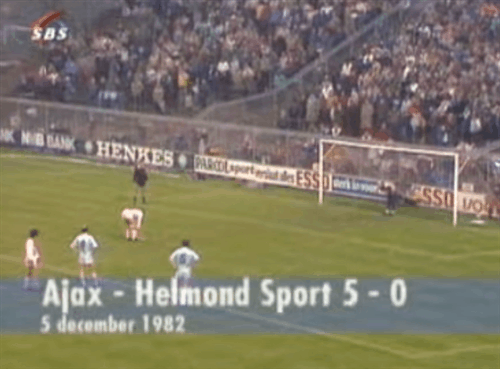 In 1978, Johan Cruyff retired from football. Unfortunately, a series of poor investments meant that he needed to come out of retirement, moving with his family to the United States of America. He He signed a deal with the Los Angeles Aztecs in 1979, being voted the NASL Player of the Year at the end of his only season there.
In 1978, Johan Cruyff retired from football. Unfortunately, a series of poor investments meant that he needed to come out of retirement, moving with his family to the United States of America. He He signed a deal with the Los Angeles Aztecs in 1979, being voted the NASL Player of the Year at the end of his only season there.
He then played for the Washington Diplomats before returning to Spain to play for the Segunda División side Levante. He returned to America after Levante failed to earn promotion, then in December 1981 he re-signed for the club with which he’d made his name.
He had spent some time at his former club as a ‘technical adviser’ in 1980, but when he signed his contract a year later he did so as a player, signing on until 1983. It proved to be a good move for both club and player, with Ajax winning the Dutch championship in both 1981-1982 and 1982-1983. In the latter of the two seasons they also won the Dutch Cup.

In spite of this success, Ajax chose not to offer him a new contract at the end of the season, leading him to sign for Feyenoord, with whom he won the title and the KNVB Cup, the first time they’d won the Eredivisie in a decade.
Cruyff the International
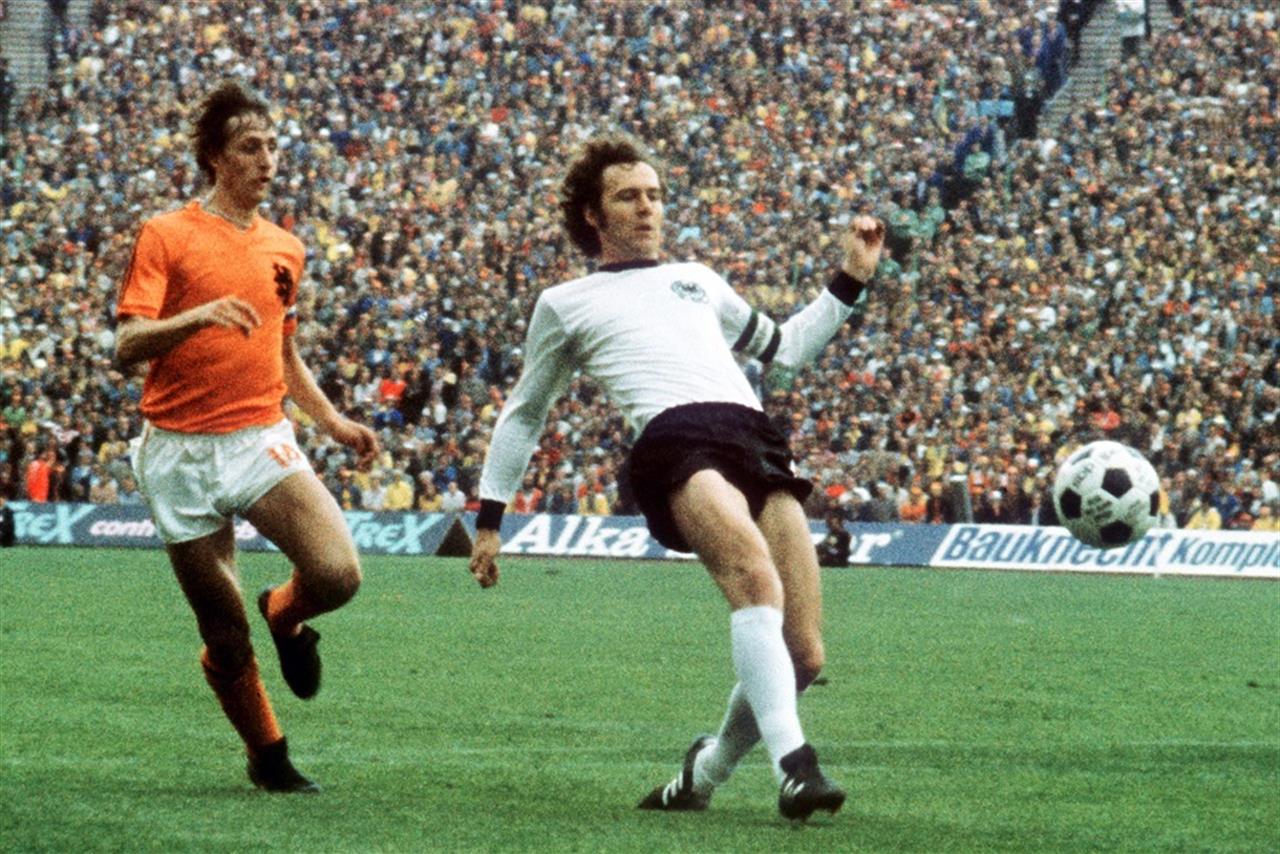
During his playing career, Johan Cruyff was, unsurprisingly, regularly picked to play for the Dutch national side. He scored 33 goals across 48 games for the Netherlands, with the national side never losing a game in which Cruyff scored a goal. His official debut came on the seventh of September 1966, getting a goal as the Netherlands drew 2-2 with Hungary.
During his next game he was sent off, becoming the first Dutch player to be shown a red card. The Royal Dutch Football Association chose to ban him from international matches but not from league or cup games.
Without the ball, you can’t win.
Johan Cruyff ⚽ pic.twitter.com/aBkxnOlltO
— ΚΡΟΪΦTURN (@kroifturn) November 13, 2023
In 1974, Cruyff was named the Player of the Tournament in the World Cup as he led the Dutch to the final, getting his team 1-0 up before West Germany even touched the ball. In the end they lost 2-1, but Cruyff had helped the Netherlands to win hearts and minds.
He helped the Dutch national team qualify for the 1978 World Cup, but a kidnap attempt faced by him and his family meant that he chose to retire rather than take part in the tournament itself. Without him, the Netherlands once again finished as runners-up, losing 3-1 to Argentina in the final of the competition.
Cruyff the Manager
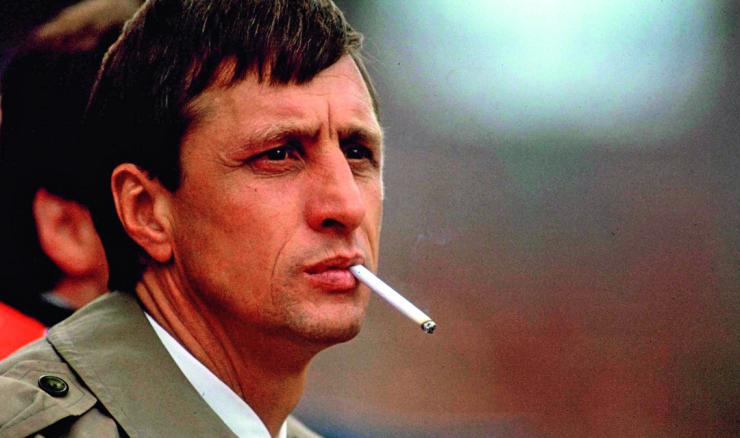
Having retired as a player, Cruyff followed Rinus Michels in becoming a manager. He led Ajax to a European Cup Winners’ Cup in 1987, winning the KNVB Cup in 1985-1986 and 1986-1987. At the start of the 1988-1989 season, he became the manager of Barcelona and worked to create his ‘dream team’.
Though it didn’t work immediately, he took risks and brought players like Pep Guardiola, Ronald Koeman and Michael Laudrup through, leading the club to two European Cup Winners’ Cup finals and the same number of European Cup finals, winning one of each.
Johan Cruyff speaks on Tika Taka and how it revolutionised football 🤝
Incredible to hear the legend behind Total Football speak about this. pic.twitter.com/HupBC8TCED
— KeyframeSports (@KeyframeSports) November 27, 2023
Under the guidance of Cruyff, Barcelona won La Liga four times in succession, with one win being, fittingly, a 5-0 win over Real Madrid. He won 11 trophies whilst at the Camp Nou, becoming Barcelona’s most successful coach. He returned to Ajax in 2008 as a Technical Director, leaving within a month. He did take up an advisory role in 2011.
During his time he was seen as being a revolutionary figure in the world of football, with many believing that he is the father of the modern day game. During his time at Barcelona, the style of football they played was named ‘tiki-taka’, which will be known to many.